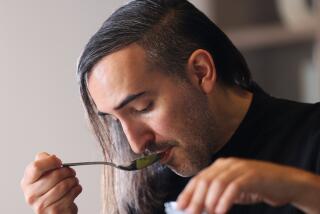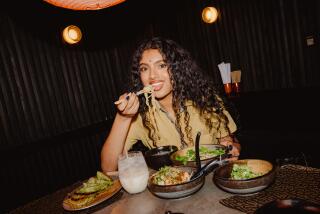Heat Wave
Here we are at Lumpinee, a groovy Thai restaurant on a forgotten corner somewhere near the Burbank airport, sandwiched between a taco stand and a Thai kick-boxing academy in a neighborhood dominated by auto body shops. Inside Lumpinee, where wonderful, rustic Thai food is the thing, you will find a wishing well, a “news corner” stocked with Thai and American newspapers, and a few patriotic gewgaws that look to be souvenirs left over from the Bicentennial. An early Santana album pulses from a group of Radio Shack speakers scattered on a shelf; Ronald Reagan gives his convention speech from the large-screen TV as some customers whoop and howl.
The air is heavy with a strange, sweet smell that you later identify as scorched iceberg lettuce, leaves of which decorate each of the many sizzling platters that make up a meal here. The ambient temperature is reminiscent of Bangkok in July. A hanging banner, one of many, reads “Thank You For Considering Lumpinee Like Your Home.” Well . . . OK. My apartment isn’t air-conditioned either.
Locally, Lumpinee is most famous for its advertising leaflets, astonishing folk-art documents that rank right up there in sheer gonzo complexity with Rev. Howard Finster’s religious paintings and squeeze bottles of Dr. Bonner’s peppermint soap, even lyrics to Nirvana songs. “Check It Out!!” it says, “The Most Delicious Thai Food.” “All Serve Very Juicy, Flavorful, Nothingelse Like It!!” “Muy Deliciosa!! We Are That Good!!” A photograph of the chef, her hands clasped as if in prayer, is captioned “Please give her a chance.” An odd intelligence is clearly at work.
Proprietor Narong Sripetch bounds up to your table, anxious as a spaniel pup. He fills you in on his health theories: “Thai people never get colds, or when they do it is one or two days at the most. I tell American customers that if they eat Thai herbs, they will also never get sick.”
“Like my wife the chef says,” he says, reading off his leaflet, “when only one musical instrument is too loud, it will give everyone headache, but when all the bass, the drum, and everything else coming together it will be fun to listen. Her food is just the same way.”
He insists that deep-country Thai cooking, Lumpinee’s vaguely Isaan-style cooking, is the only true Thai food, spicy yet balanced, subtle yet intense. He tells you about his secret sources for ingredients--as he will every time you come into the restaurant--and he hints darkly that certain other restaurants are owned by Laotians trying to pass as Thai. He takes the beer order and disappears into the back room.
There is in fact a lengthy menu at Lumpinee, pad Thai , prig king and chicken-coconut soup, but you are likely to order your dinner from the first few lines of yet another flier, one that opens “Dear Sir/Mam,” and lists 10 or so unusual, poetically named dishes, the “Deepest Authentic Thai Food,” but gives no hint as to their composition. Will Sripetch explain them? Natch.
The Waterfall is kind of Lumpinee’s signature dish, grilled beef tossed with lime juice, toasted rice powder and plenty of chile, a sputtering salad served on a red-hot sizzling platter; it seems to be on the table of most of the customers in the room. Seua rong hai , “Tiger Crying,” is a sliced marinated steak grilled rare and served with a gamy-tart, chile-red dipping sauce, so delicious--or so spicy--that it could make a tiger weep. Thai beef jerky, a chewy, char-crusted version of the Chinese dry-fried beef, comes with something that looks identical to the crying tiger’s dipping sauce but packs a distinctly saltier punch.
“You’ve just recommended three beef dishes in a row,” I said.
“Oh, but they are so different from one another,” Sripetch said, “the way that each is marinated, the way that each explodes just so in your mouth.”
He was right, of course, though it was a lot of beef. We ordered a bowl of sticky rice and ate it country-style with our hands.
Supreme Forest is a thin, musky beef curry, plangent as an oboe note. It is flavored with the usual array of Thai spices and also some duskier ones that Sripetch says people dig up for him deep in the Thai jungles. Red River is a complexly spiced version of the red beef curry panang , a little soupy, fragrant with coconut. (An order of the regular panang, which Sripetch mistakenly brought to the table at the same time, seemed monochromatic by comparison.)
There are fried meat patties, “Sundawn,” not unlike the popular Thai shrimp fritters tod mun ; and a powerful mixed-meat stir-fry, “Garlic Enlightenment”; and a spicy salad made with crunchy bits of fried fish with the smoky tang of good Japanese salmon skin. Uan-ta-leh is a garlicky platter of seafood so powerfully seasoned with chiles that the entire room begins to choke on the fumes when it is brought out on a superheated tray.
Sripetch comes over to the table with more cold beer and a boast: “We have become more and more popular with Thai chefs,” he says, “because while they may serve Chinese-style food or American-style food in their own restaurants, when it comes time to eat, they are after all Thai. And at Lumpinee, we treat all our customers as nothing less than Thai.”
Note: The string beans at Tung Lai Shun, the superb Islamic Chinese restaurant reviewed in last week’s column, are, of course, sauteed with salty crumbles of beef . I regret any confusion this error may have caused.
Lumpinee
11020 Vineland Ave., North Hollywood, (818) 505-0761. Open daily, 11:30 a.m. to 3 a.m. MasterCard, Visa accepted. Beer and wine. Takeout and delivery. Dinner for two, food only, $12-$16.
More to Read
Eat your way across L.A.
Get our weekly Tasting Notes newsletter for reviews, news and more.
You may occasionally receive promotional content from the Los Angeles Times.











